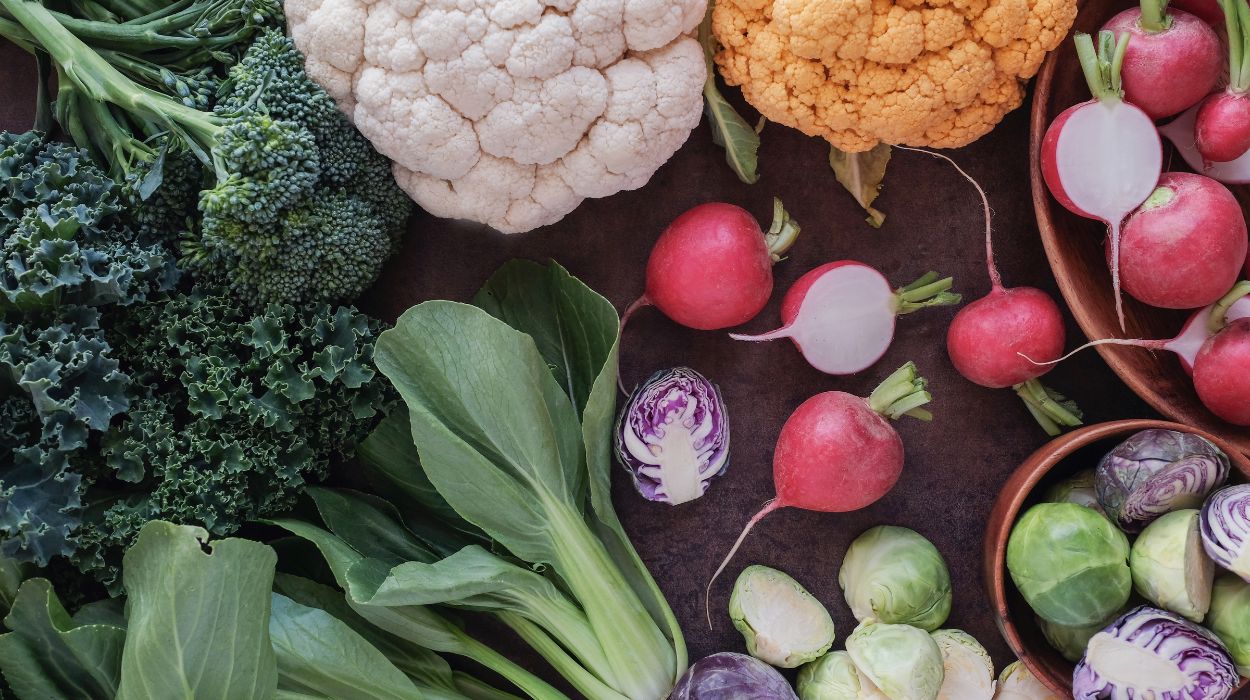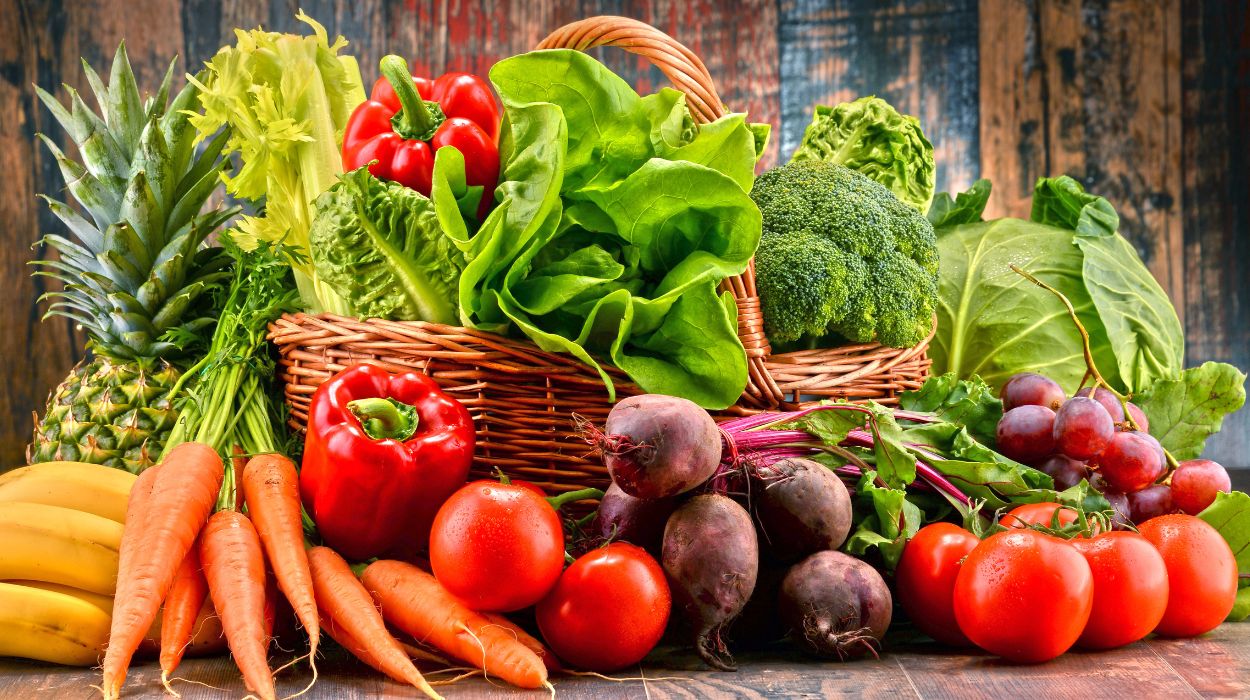When it comes to achieving weight loss goals, adding fresh fruits and vegetables to our diets is often overlooked, yet it is one of the most effective strategies alongside supplemental fat burners we try. Specifically, vegetables are low in calories and high in essential nutrients; but they also provide many health benefits that make them one of the best foods for weight loss.
From their high fiber content that promotes satiety to their low-calorie nature, vegetables play a crucial role in supporting weight loss efforts. Additionally, their micronutrients, antioxidants, and phytochemicals contribute to overall health.
This article will explore the best vegetables for weight loss. Whether you want to slim down or maintain a healthy weight, understanding the role of non-starchy vegetables in your weight loss journey helps you achieve long-term success.
Best Vegetables To Eat To Lose Weight
Regarding weight loss, vegetables are excellent choices due to their low-calorie content and high nutritional value. Some great options include:
- Leafy greens.
- Cruciferous vegetables.
- Chili and bell peppers.
- Zucchini.
- Carrots.
- Cabbage.
- Lettuce.
These vegetables are fantastic for weight loss due to their nutritional profile. Pairing them with lean proteins, healthy fats, and whole grains can create a well-rounded and satisfying meal plan to support weight loss goals.
7 Best Vegetables For Your Weight Loss Journey
The first thing you should consider when you want to lose weight is what foods are good to promote weight loss. Diet is an integral part of eating fewer calories and maintaining a calorie deficit.
Who knew the key to losing weight could be in your salad bowl or in that serving of cooked green beans? That’s right, vegetables are not just good for your health; they can also be your best friend for weight loss. Packed with vitamins, minerals, and a whole range of nutrients, veggies provide the ideal foundation for a healthy normal, or vegetarian diet.
So, what are the best veggies for weight loss? Let’s dive into them.
Leafy Greens
The first vegetables we will discuss are leafy greens. Some of them include spinach, kale, and Swiss chard. Leafy greens are incredibly beneficial for healthy weight loss, packed with essential nutrients, and low in calories. In addition, these greens are high in nitrates, which are great for managing blood pressure.
Their fiber content aids digestion, making you feel fuller for longer and promoting healthy bowel movements. Moreover, these greens are brimming with vitamins and minerals.[1] Additionally, research shows they are beneficial for reducing the incidence of cardiovascular diseases.[2]
Whether enjoyed raw in salads or cooked into various dishes such as stir-fries or soups, incorporating leafy greens into your meals is a surefire way to support your healthy weight loss goals.
Cruciferous Vegetables

Cruciferous vegetables are probably the best to eat daily for weight loss. The reason is that they are highly beneficial[3] in many ways. These include broccoli, kale, cauliflower, brussels sprouts, and cabbage.
They are high in fiber, vitamins C, K, folate, and minerals like calcium and potassium. These veggies provide vital nutrients while keeping the caloric intake in check.
Also, they are rich in antioxidants and contain compounds known as glucosinolates, which have been found to potentially help treat chronic diseases.[4] A common one is colorectal cancer.[5] Research also shows great promise for the regular use of cruciferous vegetables or supplements in the treatment and prevention of neurologic disorders.[6]
Chili And Bell Peppers
You might wonder why bell peppers are on this list. Are bell peppers good for weight loss? They are delicious and versatile and offer many health benefits that can aid in your weight loss journey. What about chili peppers?
Research[7] shows that weight loss by chili peppers results from improved insulin control. This helps to support weight management and positively affects the treatment of diseases like obesity, diabetes, and cardiovascular disorders.
Capsaicinoids in chili peppers help improve metabolism[8] and burn fat. Also, chili peppers are rich in antioxidants[9] such as vitamin C and beta-carotene, crucial in boosting your immune system and protecting against chronic diseases.
Incorporating chili peppers into your daily diet will contribute to your weight loss strategies due to their metabolism-boosting properties. Bell peppers are healthy vegetables that help promote weight loss by their fiber and low-calorie content.
Zucchini
Zucchini is a summer squash rich in water, soluble and insoluble fiber, antioxidants, and various vitamins and minerals. It may have several health benefits,[10] such as improving digestion, lowering blood sugar levels, and supporting eye health.
With its low-calorie content and high water content, zucchini is an ideal choice for those looking to shed pounds. Additionally, it boasts an impressive array of nutrients,[11] including vitamin C, fiber, and potassium, essential for overall well-being.
The soluble fiber content helps promote satiety while regulating blood sugar levels, reducing cholesterol,[12] and enhancing digestion. Furthermore, zucchini can be prepared in various ways — grilled, sautéed, or spiralized — providing versatility in culinary creations. This makes it easy to add to any weight loss regimen.
Carrots
Packed with essential vitamins and minerals like vitamin A, beta carotene, potassium, and fiber, carrots promote optimal digestion and aid in maintaining a healthy weight.
The 2.8 grams of fiber[13] in 100 grams of carrots keeps you feeling full for extended periods, reducing your cravings for unhealthy snacks. Additionally, the beta carotene in these root vegetables has a direct anti-obesity effect,[14] preventing weight gain by biological effects on the brain.
Furthermore, they promote healthy weight management due to their low glycemic index, ensuring a slow release of sugar into the bloodstream to prevent blood sugar spikes and reduce the risk of type 2 diabetes.[15]
Carrots are versatile. So, you can enjoy them raw, as a crunchy snack, or cooked in various ways like stir-frying or roasting. Their natural sweetness satisfies cravings while providing essential nutrients, making them necessary for a balanced and effective weight loss plan.
Cabbage
Cabbage might not always be the star of the plate, but this unassuming veggie packs quite a punch regarding health benefits. First, cabbage is low in calories — a whole cup of shredded cabbage has only around 17.5 calories.[16] So, if you aim to trim down, cabbage is your friend. It fills you up without weighing you down with extra calories.
But that’s not all. The vegetable has a fair share of fiber, which keeps you full and satisfied. It also has a boatload of vitamins and minerals,[16] like vitamin C, magnesium, and calcium, that support overall health.
Cabbage is super versatile. You can chop it up for salads, toss it in soups, stir-fry it with other veggies, or even ferment it into sauerkraut.
So, whether you’re crunching on coleslaw, savoring some stir-fried cabbage, or exploring kimchi variations, this veggie is a low-calorie, nutrient-packed powerhouse that can seriously amp up your weight loss game.
Lettuce

Lettuce is the last on our list of best vegetables to eat for weight loss. Lettuce is a staple in salads and is a nutritional powerhouse[17] that can aid significantly in your weight loss journey. With very few calories and almost a gram of fiber per cup, lettuce provides essential nutrients[18] such as vitamins A, K, and folate to support overall health.
For weight loss, research shows that blood sugar stays relatively stable[19] on a high-fat diet when accompanied by lettuce. This means insulin levels are balanced, and there is a lower risk of weight gain and other abnormal metabolic conditions.
Lettuce is also incredibly versatile, allowing you to experiment with various salad recipes or even use it as a substitute for bread wraps or burger buns. Darker varieties like romaine lettuce offer higher nutrient concentrations than regular lettuce.
So, adding lettuce to your diet not only aids in weight management but also contributes to improving digestion and boosting the immune system due to its rich antioxidant profile. So, lettuce is undoubtedly an excellent choice for promoting a healthier lifestyle.
The Benefits Of Vegetables For Weight Loss
As we have seen above, the best fruits and vegetables for weight loss have many benefits. However, generally, there are several benefits of vegetables. Here are some major ones:
Low In Calories
Regarding weight loss, every calorie counts, and that’s where low-calorie vegetables come to the rescue. Most vegetables are low-energy-density foods, allowing you to consume more significant portions without excess calories. This helps in supporting weight loss by creating a calorie deficit.
Other low-calorie vegetables that are good for you include cooked beets, raw mushrooms, cooked celery, and raw kale, to name a few healthy vegetables to include on your meal plan.
High In Fiber
Fiber aids digestion, keeps you feeling full for longer periods, and can prevent overeating by promoting satiety. These veggies all contain dietary fiber that works its magic by slowing digestion and helping curb cravings.
Nutrient-Dense
Vegetables are low in calories and packed with essential vitamins and minerals that are crucial in weight loss. These micronutrients are vital for maintaining a healthy metabolism and boosting energy levels.
B vitamins, for example, help convert food into energy, while vitamin C supports fat oxidation.[20] Minerals like magnesium and zinc also support metabolic function and regulate hunger hormones.
High In Antioxidants
Antioxidants are superheroes regarding overall health and can also play a significant role in weight loss. These compounds help protect our cells from damage caused by free radicals, which can contribute to inflammation and weight gain. By reducing oxidative stress, antioxidants support a healthy metabolism and help the body efficiently burn fat.
Luckily, many vegetable supplements are excellent sources of antioxidants and phytochemicals. Vegetables like carrots, sweet potatoes, and bell peppers contain high levels of antioxidant vitamins such as beta-carotene and vitamin C.
Also, tomatoes are rich in lycopene, a powerful antioxidant linked to weight loss. Veggies like onions, garlic, and cruciferous vegetables contain compounds that support detoxification and reduce inflammation.
Slow Digestion And Improved Gut Health
The high fiber content[21] in vegetables aids in slowing down the digestion process and healing conditions like inflammatory bowel disease. It helps regulate blood sugar levels and prevents sudden spikes, thus reducing the risk of developing chronic diseases such as diabetes.
Additionally, the fibrous nature of vegetables promotes regular bowel movements and prevents constipation, promoting a healthier gut environment. Furthermore, vegetables are also a great source of prebiotics — non-digestible fibers that serve as food for beneficial gut bacteria. These prebiotics encourage the growth of good bacteria in the gut, promoting better overall gut health and supporting immune function.
Tips To Help You Eat More Vegetables
Increasing your vegetable intake is no no-brainer. But how can you eat them more to boost your overall health? Here are some tips to help you incorporate more vegetables into your diet:
- Experiment with cooking methods: Vegetables can taste different depending on how they’re prepared. Roasting, grilling, steaming, sautéing, or even eating them raw can bring out various flavors and textures.
- Add them to your favorite dishes: Add vegetables to dishes you already love. For instance, toss some spinach or peppers into your pasta or add extra veggies to your pizza toppings.
- Try new recipes: Look for recipes with vegetables as the main ingredient. Websites, cookbooks, and cooking shows often have creative and tasty vegetable-focused recipes that can inspire you to try new things.
- Blend them into smoothies or soups: Blending vegetables into smoothies or soups is an excellent way to increase your intake without necessarily feeling like you’re eating a plate of veggies. Spinach, kale, carrots, and even cauliflower can easily be blended into greens powder for smoothies or soups.
- Prep in advance: Wash, chop, and store vegetables in your fridge so they’re easily accessible. Having them ready to go makes it more likely that you’ll reach for them as a snack or when preparing meals.
- Use dips and sauces: Pairing vegetables with delicious dips or sauces can make them more appealing. Hummus, guacamole, tzatziki, or even homemade dressings can add flavor and make eating veggies more enjoyable.
- Make it a habit: Gradually include more vegetables in your meals until it becomes a habit. Over time, your taste preferences can adapt, and you might crave veggies more often.
Remember, the key is finding what works best for you and making small, sustainable changes that gradually increase your vegetable intake.
Final Thought
In conclusion, having the right vegetables in your diet can be a game-changer in weight loss. These nutrient-packed powerhouses offer low calories and high fiber content and provide essential vitamins and minerals vital for overall health.
From the versatility of leafy greens like spinach and kale to the satisfying crunch of bell peppers and the metabolism-boosting properties of chili peppers, there’s a vast array of options to suit every palate and preference.
Remember, the key lies in diversity, portion control, and a consistent commitment to a wholesome, veggie-rich diet for sustainable and effective weight management.
Frequently Asked Questions
Vegetables low in calories and fiber are excellent for weight loss. Leafy greens like spinach, kale, Swiss chard, and cruciferous vegetables such as broccoli, cauliflower, and Brussels sprouts are great choices.
Yes, incorporating vegetables into your daily diet is a fantastic way to lose weight. They’re low in calories, high in fiber, and packed with essential nutrients, making them an excellent choice for filling up without consuming excess calories.
Leafy greens like spinach, kale, and Swiss chard are top contenders for weight loss. They’re low in calories, rich in fiber, and loaded with vitamins and minerals that support overall health while aiding weight loss.
Eating only vegetables for a week might result in weight loss due to their low-calorie content, but it’s not sustainable and will lead to nutritional deficiencies.
 Evidence Based
Evidence Based
